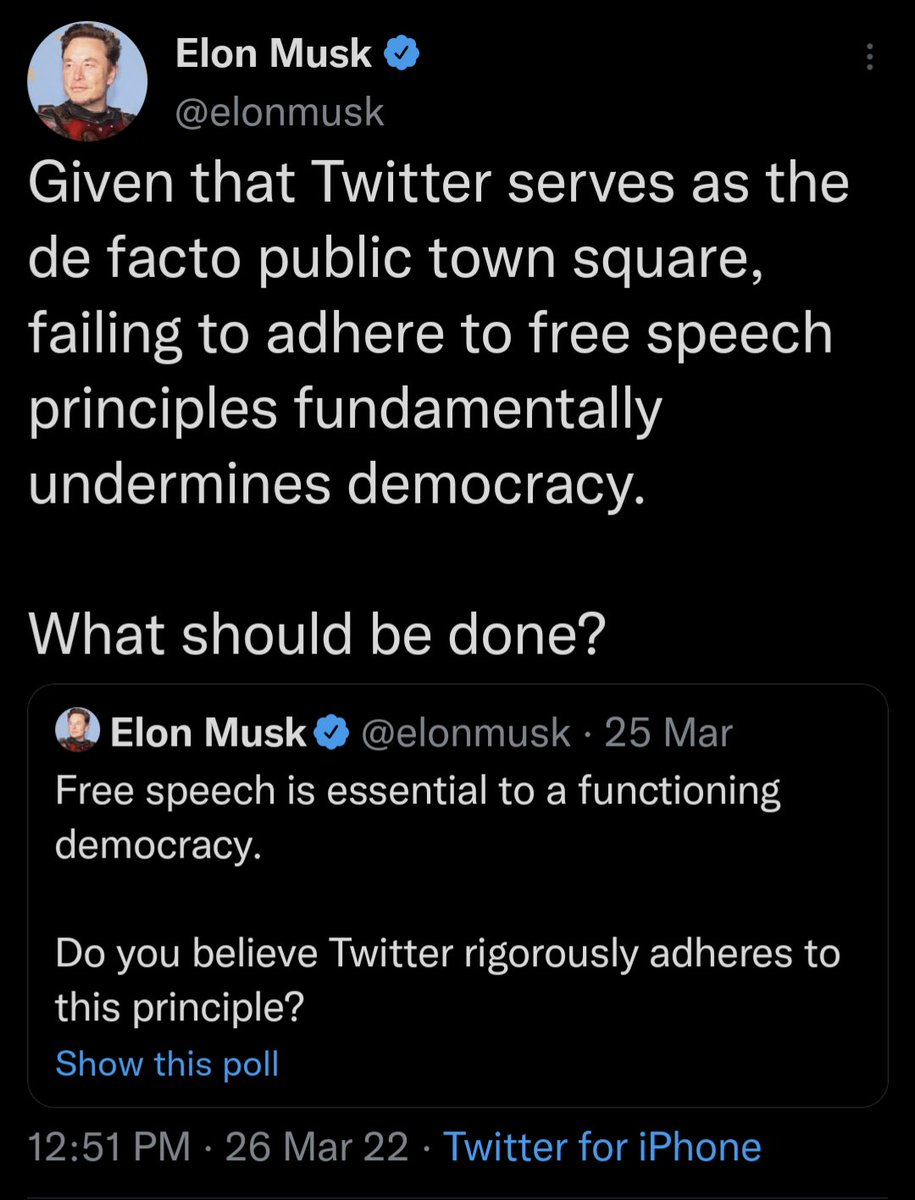Also for anyone wondering about the Twitter is a private company and it can do what it wants and is not subject to the 1st Amendment argument, this actually may change in the future if challenged in the Supreme Court due to a Supreme Court precedent.
https://www.mtsu.edu...marsh-v-alabama
In Marsh v. Alabama, 326 U.S. 501 (1946), the Supreme Court held that a person distributing religious literature on the sidewalk of a “company town” was protected by the First Amendment rights of freedom of the press and religion and could not be arrested for trespass.
Jehovah's Witness arrested for passing out religious literature in a company town without a permit
The “company town” is largely a thing of the past, but in the early 1920s much of the U.S. coal mining population lived in company-owned homes, as did many southern cotton mill workers. Company towns comprised a small, but not insignificant, percentage of traditional public space. Around this time, the Gulf Shipbuilding Corporation built homes for its workers, streets, sewers, and a downtown business district in Chickasaw, Alabama (a suburb of Mobile).
Gulf did not prohibit individuals from neighboring areas from entering Chickasaw, driving on its streets, and shopping in the business district. When Grace Marsh, a Jehovah’s Witness, began passing out religious literature on the sidewalk in front of the post office, however, she was told she would not be given a permit to distribute the literature and was asked to leave. Marsh refused. She was arrested and charged under state law with trespass on Gulf property. Marsh’s conviction was affirmed by the state appellate court and the Alabama Supreme Court. In the trial court and throughout the appellate process, Marsh argued that her individual constitutional rights of freedom of press and freedom of religion should not be trumped by the private property owner’s right to exclude.
Court found that the company town functioned like a public town
The U.S. Supreme Court examined the manner in which the Gulf-owned property functioned in the community. Writing for a 5-3 majority, Justice Hugo L. Black noted that “[t]he more an owner, for his advantage, opens up his property for use by the public in general, the more do his rights become circumscribed by the statutory and constitutional rights of those who use it.” The Court continued, “Whether a corporation or a municipality owns or possesses the town[,] the public in either case has an identical interest in the functioning of the community in such manner that the channels of communication remain free.” Accordingly, the Court reversed Marsh’s conviction, concluding that the state could not use a trespass law to punish Marsh for distributing religious literature on the sidewalk of a company town.
Three justices—Stanley F. Reed, Harold H. Burton, and Chief Justice Frederick M. Vinson—dissented. Reed wrote, “The rights of the owner, which the Constitution protects as well as the right of free speech, are not outweighed by the interests of the trespasser, even though he trespasses in behalf of religion or free speech.”
Case has remained a guiding principle of constitutional law
Although Marsh was decided at the end of the era of company towns, its central holding has remained a guiding principle of constitutional law. Two decades later, the Civil Rights Act of 1964 limited private property owners’ ability to refuse entry or service to individuals on the basis of race, color, religion, or national origin in places of public accommodation. Additionally, Marsh became the conceptual foundation for PruneYard Shopping Center v. Robins (1980) and other cases in which individuals claimed First Amendment rights of speech and free exercise in shopping malls, airports, and other quasi-public spaces.
As you can see this Supreme Court precedent allowed the extension of 1st Amendment constitutional rights to several private businesses (highlighted in red) many of which acted as quasi-public spaces.
This precedent hasn't applied to the digital space at the moment as it hasn't been challenged in the Supreme Court yet. However due to certain big tech social media companies acting like quasi-public spaces in the digital sphere (Twitter, Reddit, Facebook etc...), there is a high chance that if this was challenged in the Supreme Court, the 1st Amendment right could extend to those Big Tech US companies as well. Then it won't be the government infringing on your 1st Amendment right, it will be the companies themselves when they censor you.
How this would work with moderation and such I don't know (will probably have to be written in Law like the Civil Rights Act), but there's precedent for such a case.
What makes this more likely to get to this point is ELON MUSK. Why?
https://twitter.com/...777261654605828

He's basically giving the exact reason for the Supreme Court to use the precedent which they have already made, and later extended to several businesses with private properties.
Remember the Supreme Court ruled in the original case that the company town functioned like a public town. Elon Musk is saying "Twitter serves as the as the de facto public town square".
Right now even he himself is not limited by the 1st Amendment and can do what he wants. But if it goes to the Supreme Court, lets say Twitter censors someone and they take Twitter to court claiming their 1st Amendment right had been violated as Elon Musk proclaimed "Twitter serves as the de facto public town square", and the court rules in that persons favour, then as aforementioned it's not going to just affect Twitter where the 1st Amendment right will extend to, but all big tech companies that act like town squares or quasi public spaces.
Food for thought.
Edited by Mr Serendipity, 16 December 2022 - 01:12 PM.





























































